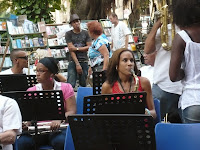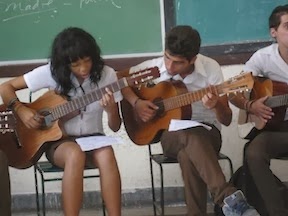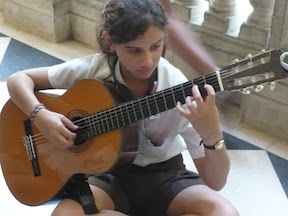Writing about the Leo Brouwer Music Festival - it clings to
the name chamber music festival but is much broader than that - is hard
precisely because it is so large and so eclectic that no short description
seems possible. A perfect
connection, combination, union of intelligent music is the official
description. Genre-bender Leo Brouwer sees not only the connections between
many types of music - everything first-rate of its kind and nothing trite or
over-exposed - but between music and the other arts. The festival includes concerts, plastic art exhibits, film,
and dance, but mostly concerts.
Every year, and this is my third Festival, (the Festival
itself is 5 years old), I get my mind and my tastes expanded a bit. Last year a standout concert for me was
Sytse Buwalda, the male contralto.
But I thought I didn't even like countertenors. A huge unexpected pleasure this year
was Il Dilirio Fantastico, a French early music group, especially Virginie
Botty on recorder, (that boring instrument, I had felt - I used to play it.)
The biggest thing for me this year was unexpected and very
moving - I heard Leo Brouwer play guitar.
He came out with a guitar in hand for the last piece on the Pablo
Milanés half of the concert
Amor de Ciudad Grande, played an
introduction to the piece that included one of the estudios sencillos, and
accompanied the song. Wild rumor
ran through the hall - he'd had an operation and his hand was now OK, he would
resume playing in public.
Unfortunately, this was false - he played with thumb and 2 fingers as a
tribute to friendship and to José Martí.
Not at all incidentally, the two pieces by Brouwer which opened this
concert - Es el amor que se ve, written in 1972 for voice, flute, violin, cello,
piano, guitar and vibraphone; and Elegías Martianas written in 2009 for flute
and piano - were stunning. This festival will be a revelation for those who
think of Brouwer as a "guitar
composer." He is that,
also, but most of his work is for
other instruments.
So what else did I hear?
An
organ concert starting with a piece by Arnolt Schlick (15th C.) and ending with
Bach and Vivaldi. A concert by
Paco de Lucía and his group. A
concert that sandwiched works by Vivaldi with Minimalist works, including Steve
Reich, Michael Torke, Brouwer, John Adams, Terry Riley - I got to hear "In
C" live. A concert with
chamber music by and about Verdi and Wagner. A concert with music by Brazilian composers - I was
expecting the usual charming light-weight pieces and I was quite surprised: of
course Brazil has composers who are part of their culture but not tied to
folkloric music. Did I expect that
Villa Lobos would be an isolated artist?
A
concert of choral music by Cuban composers, and later the same day a concert of
Brouwer works interpreted as flamenco.
A concert dedicated to Benjamin Britten, with his Green Broom and The Evening Primrose for chorus, and the
Sonata Op 60 for cello and piano - stunning-, and works by Hindemith (The
Sonatina Canonica for 2 flutes Op 31, which was like being in a magic forest in
a dream with the best possible sounding birds in the world), Brouwer, Alvarez,
and Popper, plus Arvo Part's Cantus in Memoriam Benjamin Britten. This concert featured Douglas Vistel on
cello, who was so good it was startling.
Cello, like choral music and guitar, seems to be a Cuban strength. Young Cuban cellist Alejandro Martinez
is very very good indeed and some day I will be proud to say "I knew him
when..." Vistel, with his
wife Almuth Krauber on piano, is the amazing Berlin-based Duo Cello Capriccioso
- hear them if you possibly can.
The
concert Sonatas, Concertos y Fantasias, in the beautiful old church San
Francisco de Asís, with Scarlatti, Mudarra, Sanz, de Murzia - and Brouwer -
played on baroque guitar, lute and ...electric guitar... (I admit this latter
didn't work for me. It didn't work
for the church's electrical system either, and somehow caused the organ of Il
Dilirio Fantastico to burn-out something.
A longer than planned intermission occurred while Vincent Bernhardt
tuned the harpsichord so that the concert could proceed.) The second half was all Vivaldi
Concerti and never needed to end, really.
Yes, there's a lot more to Vivaldi than Four Seasons. A Lecuona concert. A flamenco concert with a flamenco
purist from a long tradition, Carlos Piñana (unlike fusion players like
Tacoronte and, yes, de Lucía). A Benny Moré tribute concert. There were also mini-concerts
associated with the conferences, and some miscellaneous which was enjoyable,
and a lot of movies and jam sessions which I missed but which sounded as if
they were interesting and fun. I'm
tired of typing, though, and this is long enough.
There
are some things you can count on at the Leo Brouwer Chamber Music
Festival. You will hear music
played by excellent artists, both Cuban and international, in well thought out
programs. You will not hear any
warhorses, and will have the opportunity to expand your knowledge and
taste. You will hear lots of
Brouwer, almost all of it works you were not familiar with. You will see lots of Brouwer, too; this
is truly his festival and his vitality and intensity as a conductor and as a
person will impress you. As the
festival grows, he has become increasing busy, but he's very gracious and
you'll have time for a brief chat or two.
It will be great fun and
just a tiny bit over the top. You
will not have time for everything.
Something unexpected will happen that will make you feel happy and
fortunate.
footnote: El hombre escapa'o
In one of the conferences, José Martí was quoted to the
effect that "La música es el hombre escapado de si mismo." Later that night, after the concert, I
got a ride home (you stand on the right street, stick out your hand, a jitney
cab stops or sometimes someone who's driving the work-truck home and just wants
to make the 10 pesos - this was the latter.) Where was I coming home from? A Leo Brouwer Festival concert. " Leo Brouwer? Este hombre es escapa'o!" Cuban
slang for totally awesome, involved heart and soul. I was struck by the coincidence, but not by the fact that a
random person driving home has an opinion about the country's leading
composer. That's just Cuba.
 |
| Maestro Brouwer |
 |
This is the organizing genius who puts together this festival - Musicologist Isabelle Hernandez
It must require the combined talents of a caterpillar tractor, a ballet dancer, a senior diplomat, and, Oh Yes, a musicologist.
(She's married to Leo.) |
 |
| After a chamber music concert in the beautiful Basilica Menor del Convento de San Francisco de Asis, the audience danced through the streets behinds sanqueros on stilts to Casa de Africa for another concert. |
 |
| If there are few concert pictures here, it's because my camera just wasn't up to the challenge of movement in darkness. |
 |
| with Pedro Chamorro and one of the organizers |
 |
| Edin Karamazov, Sytse Buwalda, and Leo Brouwer |
 |
| with Eusebio Leal, historiador de la ciudad, responsible for much of the restoration of Old Havana |
 |
| A concert in the park |


 |
Conferences were held in the Antigua Casino Español, and students,
as well as other members of the public were invited. |
 |
| with Saskia Spinder |
Sytse Buwalda, Dutch contralto
 |
Joe Ott Pons, guitarist.
He won the Premio Espiral Eterna for musicians in 2012 |
 |
| Artists from Grupo Giganteria acted as auxiliary ushers |

 |
| Costa Rican composer Marvin Camacho performing his own work. |

 |
Cellist Alejandro Martinez and Percussionist Eilyn Marquetti Gonzalez
creating the first performance of a work by Costa Rican composer Eddie Mora |
 |
Cellist Alejandro Martinez
won the Espiral Eterna musicians prize in 2011 |
 |
ofibrouwer@cubarte.cult.cu
Berta Rojas and Bobby McFerrin, among others, will be at the 6th annual Leo Brouwer Chamber Music Festival
September 27 to October 12 2014 |
 |
| The organizers, hard at work, but not showing any sweat. |






















































